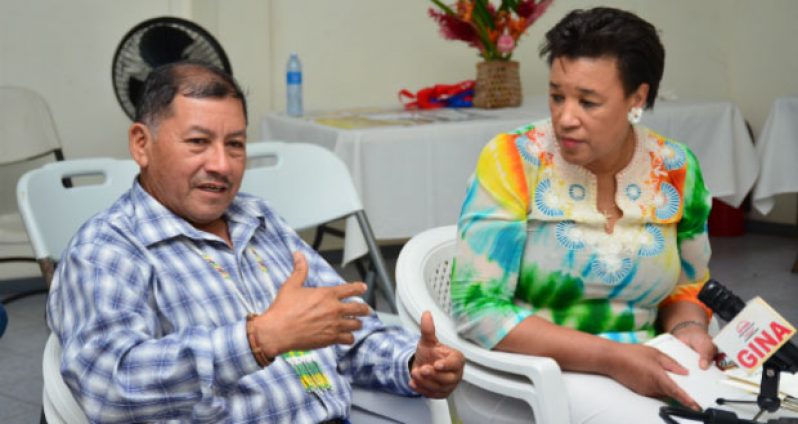By Patricia Scotland, Commonwealth Secretary-General
FROM above, Guyana’s Iwokrama tropical rainforest reserve is a feast for the eyes: Acres and acres of lush, green vegetation, interrupted by meandering rivers with pristine mirrored surfaces. And beneath the seemingly never-ending stretch of treetops is an explosion of exotic life, including at least 1,250 plant species, more than 500 species of birds; and endangered giants such as the world’s largest otter, river turtle, anteater, caiman and fresh water fish.The stunning Iwokrama is at the centre of the Guiana Shield – one of four remaining tropical rainforest ecosystems in the world. For many this is a prime tourist destination, but for Sydney Allicock, Guyana’s fourth Vice-President and Minister of Indigenous People’s Affairs, this is home. At the invitation of the President of Guyana, David Granger, we visited the centre together to discuss recent developments.

A member of the indigenous Macushi tribe, Minister Allicock grew up in Surama village, just outside the Iwokrama International Centre for Rainforest Conservation and Development, which was jointly founded by the Government of Guyana and the Commonwealth Secretariat. His father Fred helped to set up and manage the Centre.
It was our starting point for a voyage through the nearly one million acres of reservation lands. As we travelled, the minister told me about his battle to protect the delicate and invaluable ecosystem, often referred to as the lungs of the earth.
The ancient wisdom and practices of the Macushi people, he says, may hold the answers to averting the impending doom of climate change. “Today I see a circle, we are coming back to a recognition of the value of the indigenous way of life and our principles about how we treat the environment, how we conserve and take just what we need, not be greedy. We need to understand our role in the ecosystem, so we can benefit from the forest while keeping it in its pristine state,” he tells me as we stand in the shadow of the roaring, majestic Kaieteur Falls – the world’s highest single-drop waterfall.
For centuries, the indigenous people in Guyana co-existed in harmony with the animals and plants around them. For many of these communities, every life — from the tiniest creature to the great monsters of the wild — is sacred and respected. Often these values and beliefs are dismissed as primitive and mystical.
Unfortunately, for centuries, our attitude was that we could take whatever we want from the earth without consequences — until the day we woke up to the fact that killing our forests and polluting our atmosphere were acts of mass suicide. And now we are hurtling toward disaster at a frightening pace, and we are still not really motivated to change our actions.
Today’s reality is that 14 to 16 million hectares of rain forest are lost every year, and deforestation is thought to be responsible for 20 per cent of the global emissions of greenhouse gasses.

Caribbean Leaders met in Guyana this week at the Caribbean Community summit. Dominica was due to host the meeting, but couldn’t because the country is still recovering from the economic blow dealt by hurricane Erika, which took lives and swiped 90 per cent of that country’s GDP in minutes.
These are the realities of climate change – the enemy of economic stability and sustainable debt management. This is why helping countries to honour agreements made in December at the COP21 climate change summit is one of my priorities.
Since taking office, I have hosted a high-level dialogue on climate change to capture the views of experts and thought leaders on the topic, so that we could better shape our response.
The Commonwealth Secretariat has proposed the new Multilateral Debt Swap idea to discount loan repayments to the value of climate action. We are also establishing our Climate Finance Access Hub, which will help countries access some of the substantial amount of money already pledged for climate change mitigation.
But we also absolutely need to support Iwokrama and the centre; firstly, because the world cannot survive without its lungs, and secondly because of all the critical research and innovation

happening there.
I was particularly impressed with its involvement in biodiversity initiatives and cutting-edge ‘biomimicking’ projects, which could copy nature’s processes to help the world heal itself. What makes the centre really interesting is that it is plugged in to the wisdom of the indigenous people, who can share ideas about how to benefit from our planet’s resources without causing it harm.
My hope is that hundreds of years from now, my great-great-great-granddaughter will be able to hop on to her solar-powered hover craft and glide across the Iwokrama rain forest, and enjoy the delights of nature that I experienced this week. If we fail to reverse climate change, there might be no Iwokrama for her to visit.




.png)









